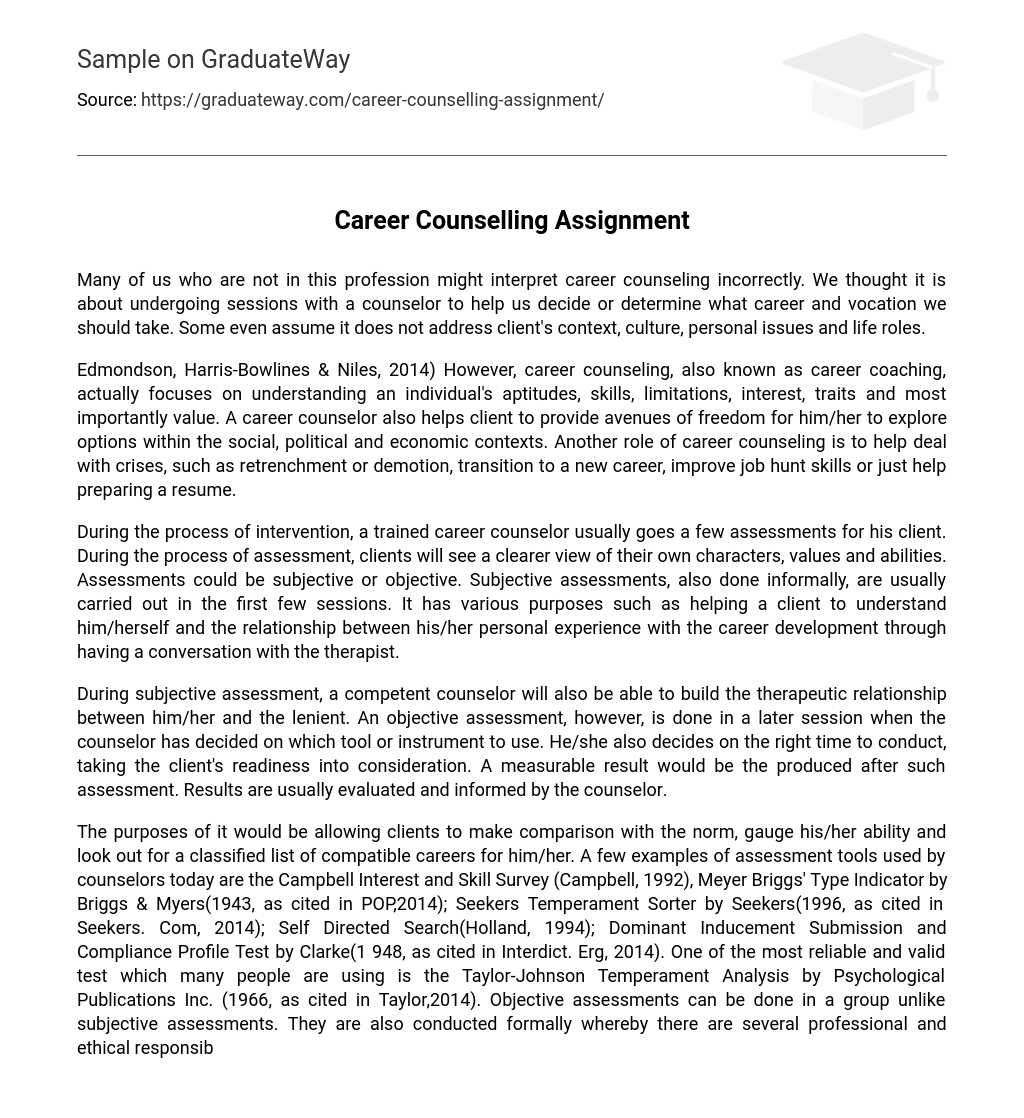Many of us who are not in this profession might interpret career counseling incorrectly. We thought it is about undergoing sessions with a counselor to help us decide or determine what career and vocation we should take. Some even assume it does not address client’s context, culture, personal issues and life roles.
Edmondson, Harris-Bowlines & Niles, 2014) However, career counseling, also known as career coaching, actually focuses on understanding an individual’s aptitudes, skills, limitations, interest, traits and most importantly value. A career counselor also helps client to provide avenues of freedom for him/her to explore options within the social, political and economic contexts. Another role of career counseling is to help deal with crises, such as retrenchment or demotion, transition to a new career, improve job hunt skills or just help preparing a resume.
During the process of intervention, a trained career counselor usually goes a few assessments for his client. During the process of assessment, clients will see a clearer view of their own characters, values and abilities. Assessments could be subjective or objective. Subjective assessments, also done informally, are usually carried out in the first few sessions. It has various purposes such as helping a client to understand him/herself and the relationship between his/her personal experience with the career development through having a conversation with the therapist.
During subjective assessment, a competent counselor will also be able to build the therapeutic relationship between him/her and the lenient. An objective assessment, however, is done in a later session when the counselor has decided on which tool or instrument to use. He/she also decides on the right time to conduct, taking the client’s readiness into consideration. A measurable result would be the produced after such assessment. Results are usually evaluated and informed by the counselor.
The purposes of it would be allowing clients to make comparison with the norm, gauge his/her ability and look out for a classified list of compatible careers for him/her. A few examples of assessment tools used by counselors today are the Campbell Interest and Skill Survey (Campbell, 1992), Meyer Briggs’ Type Indicator by Briggs & Myers(1943, as cited in POP,2014); Seekers Temperament Sorter by Seekers(1996, as cited in Seekers. Com, 2014); Self Directed Search(Holland, 1994); Dominant Inducement Submission and Compliance Profile Test by Clarke(1 948, as cited in Interdict. Erg, 2014). One of the most reliable and valid test which many people are using is the Taylor-Johnson Temperament Analysis by Psychological Publications Inc. (1966, as cited in Taylor,2014). Objective assessments can be done in a group unlike subjective assessments. They are also conducted formally whereby there are several professional and ethical responsibilities that the counselor should possess. Generally, a professional counselor should be knowledgeable about the state and federal laws of counseling-related activities and be in compliance with them (ONCE, 1995).
Counselors also should be honest with the working experience, qualifications or license when being employed or presenting themselves to the public. AC(2014) states that it is not professional for counselors to solicit testimonials from their clients or former clients, without cussing the implications and obtaining permission. One of the ethical responsibilities a counselor should have is treating all clients fairly regardless of their cultural background, behavior or socio-economic status.
Counselors, as human beings, do have the tendency to treat clients differently as each individual has their own unique personality and appearance. Some are likeable, but some are not. However, competent counselors would be firm with keeping up with their moral values and not surfacing their personal thoughts or feelings towards their clients. It is also ethical for counselors to maintain a counselor- lenient relationship, instead of becoming other roles such as friends or significant others for their present or past clients. Every counselor should be guided by a code of ethics to conduct assessments for the clients.
A commonly adhered code of ethics is prepared by the American Counseling Association. Another important ethical responsibility a counselor should possess is respecting the privacy and confidentiality of all his/her clients. Counseling is an activity to be conducted in a private setting where all the information given by client ought to be kept confidential. Assessments are an integral part in career counseling. As trained and competent counselors, they should observe some guidelines before, during and after conducting assessments to their clients.
According to Sucker(2004), before conducting the assessment, it is relevant that the counselor should explain the procedures clearly for the client or the group of clients; tester must also be someone who the client is familiar with; and assessments should be conduct in a conducive environment. Professional counselors must be able to describe the test’s content, nature of questions clients should expect and how the outcome will be used to make decisions. A tester, or administrator, can be accompanied by assistants if the size of the group taking the test is large.
Administrator and assistant should be people the clients are familiar with. This is in view of the fact that having a stranger to be authorized to look at their answers could affect their confidence and integrity. The environment chosen for the assessment to be conducted must be made easy for clients to have full concentration. This refers to the physical setting where the test is conducted, quiet and has proper air ventilation with proper seating. If there is a group of test Akers, they should be seated in a distance away to make it hard for them to copy one another.
During the assessment, there are some directions the tester has to follow. AC(2014) states that counselors do not allow unsupervised assessment, unless the assessment tool used is designed for self-administration. This means tester and assistant should be supervising the test takers throughout the whole process of assessment. They are encouraged to walk around to ensure the test takers are in compliance.





